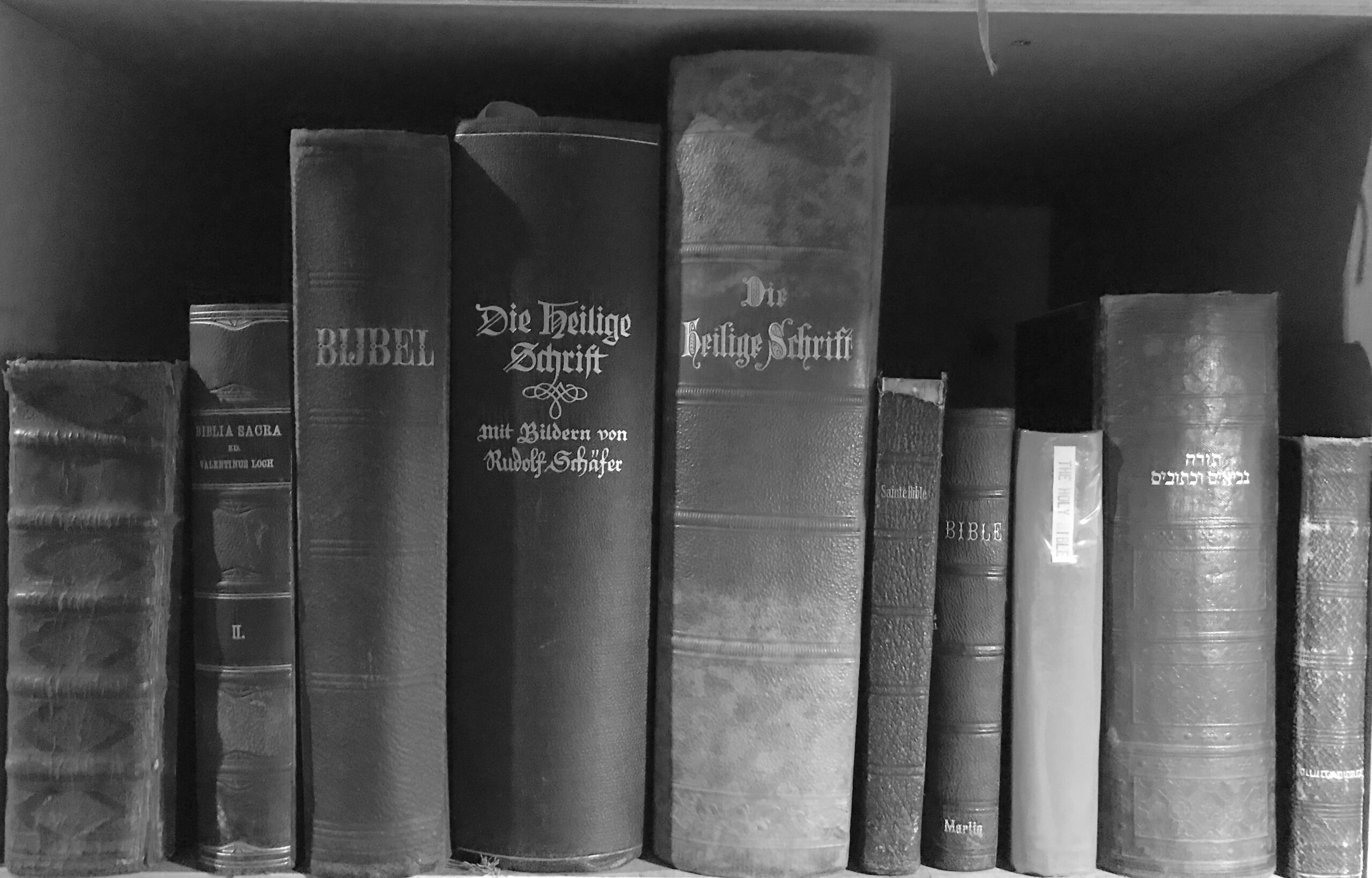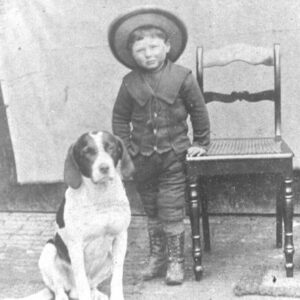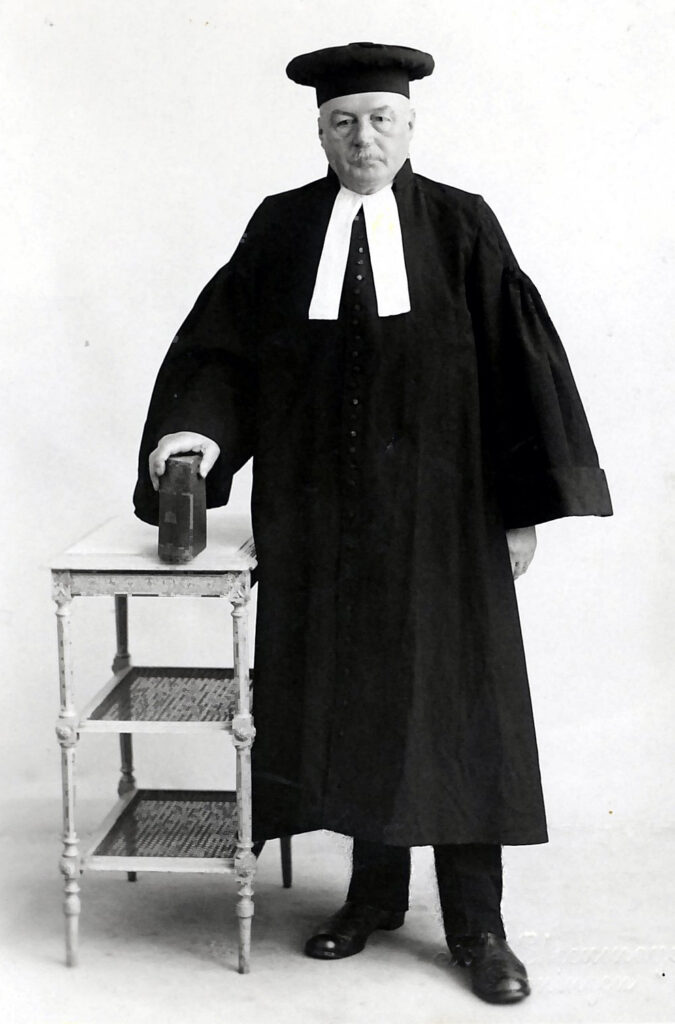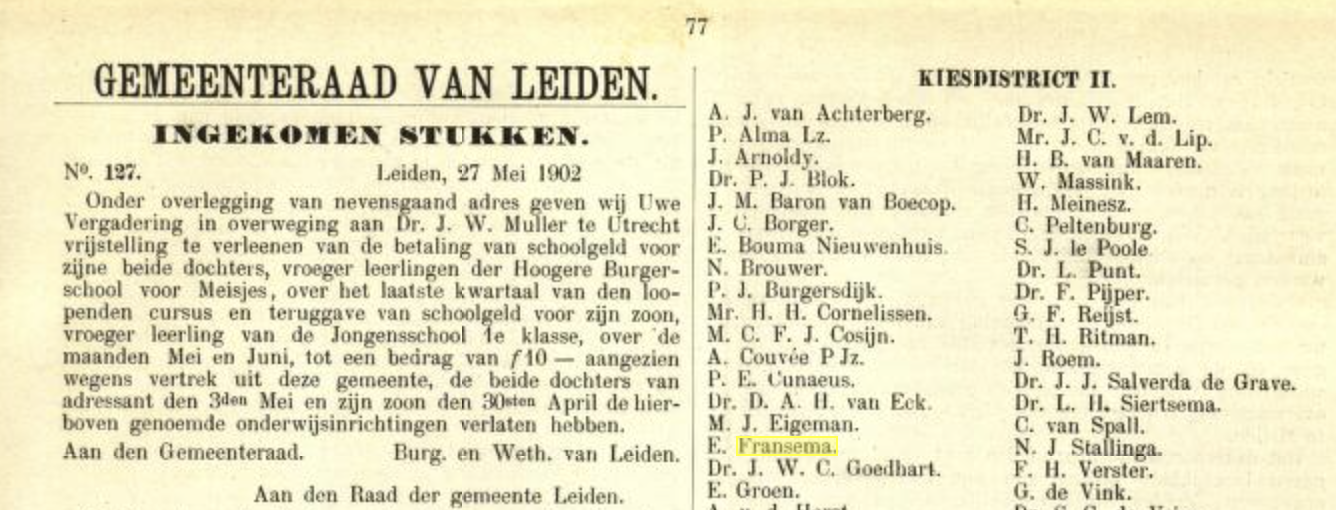Living to excess:
The passions of Ekke Fransema
While his relatives were still busy picking up the remaining empty bottles behind the disorderly piles of books in the attic, the flag was lowered at Café Kooi following his death on 11 January 1928. Books and alcohol – not necessarily in that order – constituted the life of Ekke Fransema (1864-1928), bibliophile and collector in Godlinze. An intellectual living on private means who lacked any career aspirations, he amassed in his lifetime an impressive collection of books in the fields of Old Dutch law, history and theology which can still be called unique. In the north of the Netherlands, Ekke Fransema is collectively remembered as the most erudite alcoholic of the second millennium. For the inhabitants of Godlinze he was ‘Our Frans’: a peculiar, but warm-hearted – at any rate generous – man. His wife Hillegonda Venhuis for her part thought he was extravagant and intractable, but then she had to live with him. Whatever the case may have been, Ekke Fransema was one of a kind.
By Lucia Suk
With permission copied from “Verhalen van Groningen”
The young
Ekke Fransema
(source family archive)
Ekke Fransema was born in Huzaarekkum in 1864, a hamlet near Adorp *just north of Groningen city*, as the child of affluent parents. He had a carefree childhood and was extremely fond of his mother, who spoilt her only child. The story goes that Ekke once climbed on the roof of his parental home, threatening to jump if she would not at once hand him ten guilders (a small fortune in those days). With tricks like these, Ekke was never short of cash.
Off to the hussars (but not for long)
In 1873 Ekke’s father, who had made a considerable fortune through hard work, bought a mansion with land in Godlinze, *a village north of Appingedam*. This is where Ekke lived for a large part of his life and where he also passed away. He attended the primary school of master Venhuis, whose daughter Hillegonda was one of the pupils. Fransema would later marry her. At the age of 13 he was sent to boarding school for a year. He then passed the entrance exam for the secondary school in Groningen city that prepared for higher education. Fransema attended this Praedinius Gymnasium for a couple of years, but then decided to join the hussars. He had signed up for five years, but life in the cavalry proved less comfortable than with his mother in Godlinze, who missed her son terribly. The result was that Ekke’s father had to compensate the Dutch army by financing a replacement for his son.
Wife, child, final exam
After his stint with the hussars, Ekke went to a Christian secondary school in Doetinchem called “Ruimzicht”, which had been founded by the renowned reverend Jan van Dijk. When he returned to Godlinze he married Hillegonda Venhuis in 1886. Ekke was still without a job, but that same year their first son Jan was born. With financial support from Ekke’s parents, the young family moved from the north to the west of the Netherlands so that Ekke could take up law at Leiden University. But first he passed his grammar school exam, at the age of 28.
A passion for collecting
It was in Leiden that Ekke first started collecting books in the field of Old Dutch law. In was also in this city that he developed an inordinate passion for the bottle. He soon passed his BA exam, but then alcohol put a stop to things. In 1893 the couple’s second son Toon was born. When Ekke’s father passed away in 1895, Ekke began expanding his library on a grand scale. He collected documents and books in the fields of law, theology and the history of the three northern provinces *Drenthe, Friesland and Groningen*. He acquired only those books he needed for further study and books on subjects that took his interest. The library became Fransema’s life’s work: he would continue working on his collection for the rest of his life.
Two years after the death of Ekke’s mother in 1904, Ekke and Hillegonda moved back to Godlinze to manage the family’s property. Once back in the village of his childhood, Ekke’s chief occupations were his books and his daily visits to Lub Kooi’s pub. His alcohol dependency soon became so disruptive that the family began to suffer. His eldest son Jan, who was now an engineer, emigrated to the United States, and Ekke and Hillegonda became estranged. Alcohol takes its toll, and it also took its toll on their relationship.
A Penchant for Pranks
Meanwhile ‘Our Frans’ continued to be a well-liked guest at Café Kooi. He often stood rounds and was always in for a good joke. Once he bought up all of a local pig farmer’s litters and had them rounded up in a livestock vehicle. Ekke then ordered the tailboard of the vehicle to be lowered, causing the piglets to scatter through the main street, which created havoc in the village. In 1914 pranks like these had become more than his wife could bear
and she had Fransema put under
legal restraint. His book-collecting
passion and his excessive
drinking cost him more than he
could afford as a man living on
private means.
Ekke eventually returned to his
legal studies at the age of 47,
obtaining his MA degree when he
was 61. He would not live to enjoy
his newly won degree for long, as
the fledgling legal expert died in
Godlinze aged 63.
The Fransema collection
Fransema’s collection barely escaped being dispersed among several second-hand dealers after his death. In the end, the collection found a home in the public library of Appingedam, where a space was reserved for Fransema’s books. Orderly arranged and catalogued, the Fransema collection can still be consulted in a special room in the library: ‘the Fransema cabinet’.[1]
The collection contains many rare works (some of them not even to be found in the National Library of the Netherlands!), many first editions and special editions or publications on specialist subjects in Dutch law. One of them is a book on jurisdiction, De Grietman Rudolph de Mepsche, *by G.M. Cohen Tervaert*. Fransema’s help is acknowledged in the preface as he gave the author a number of very rare books on loan to help him with his research. The dissertation, which was published in 1921, deals with criminal law cases in the hamlet of Faan in 1731, when 22 men were accused and convicted of having engaged in homosexual acts (a punishable offence at the time). They were executed in *nearby* Zuidhorn, *a village west of Groningen city*. They were strangled, some of them first scorched in the face, after which their bodies were burnt in a notorious episode still known as the “Faan Mass Trial”.
[1] Lucia Suk’s post appeared before 2017, the year when Fransema’s collection was removed from the public library of Appingedam. After having been kept in storage for a number of years, the collection has now found a new home in Museum Møhlmann in Appingedam in 2021.
ATTENTION: Fransema’s collection in Museum Møhlmann can be consulted by appointment only.
Varied contents
Fransema devoted a great deal of attention to his collection, exclusively acquiring books on subjects that interested him. He was not simply concerned with the physical qualities of the books, but was more interested in their contents.
The collection includes some beautifully illustrated leather-bound early Bibles, one of which dates to 1657. In addition to works by the late *19th-century Calvinist theologians* Abraham Kuyper and Herman Bavinck, the collection contains many books on the history of the *northern* Netherlands, such as De geschiedenis der watervloeden aan de kusten der Noordzee, *a translation of a German work on North Sea coast floods,* and *Groningens rust, geboren uit onrust, an account of Stadholder William IV’s rule in the north, published in 1748*.
The collection also includes Groningen student almanacs from 1830 to 1875 and books on the history of Groningen University. Fransema acquired travel guides of the province and city of Groningen, *but seems to have made a trip to the neighbouring province Friesland as is witnessed by* the Geïllustreerde gids voor Franeker published in 1906. It is worth browsing for its curious advertisements alone! Other noteworthy titles in the library are De hedendaagsche moraal (1902), *a book on contemporary morals by the previously mentioned Calvinist author Bavinck*, and Over oude en latere Drinkplegtigheden, vooral der Scandinaviërs, Germanen en Nederlanders (1842), *on ceremonial drinking in the north-European countries*.
Lending
In his own lifetime, Fransema opened up his collection to the villagers of Godlinze on Saturdays. They were also allowed to borrow books from the library, with the exception of rare books. As far as we can tell, he never kept a record of these loans. Even today, the Fransema Cabinet in Appingedam is visited on an almost daily basis by a regular group of interested readers. It is no longer possible to borrow books, but the collection can still be consulted.
.
FRANSEMA LECTURE "REBORN"
6 JUNE 2025
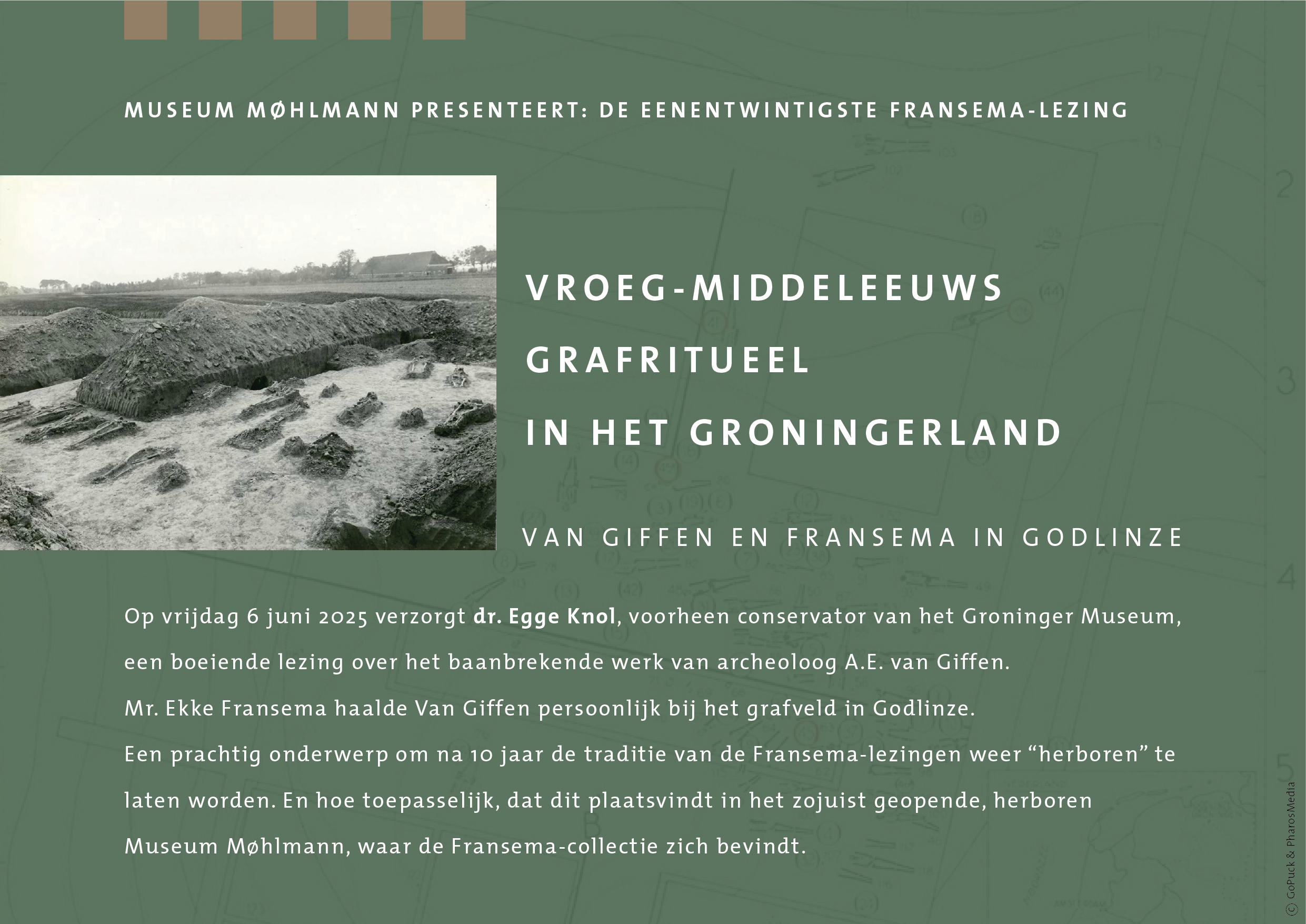
Twenty Fransema lectures in all were organized with some regularity between 1990 and 2015. We are very happy to have been able to revive this fine tradition.
6 June 2025 was a memorable date: that evening, dr Egge Knol gave a fascinating lecture on the pioneering archaeologist Albert van Giffen, who had been asked by Ekke Fransema to examine an excavated urn and a number of bones, near Godlinze. These finds turned out to be part of an early medieval grave field, which was to be meticulously excavated and documented by Van Giffen. It is still considered to be a major project.
Egge Knol introduced us to the early stages of the career of Van Giffen, who after having obtained a degree in biology turned his scientific attention to archaeology. Knol, who himself took part in the excavations at Hogebeintum – likewise an artificial dwelling hill or terp – is a specialist in archaeological terp research and an expert on Van Giffen. In a lively manner and interspersed with a few humorous anecdotes, we were offered an intriguing insight into the period when these grave fields came into being, but also into the ways in which archaeology was conducted (and frustrated) in Van Giffen’s time. So much was lost, for instance, due to the sale of fertile terp soil, which was in great demand after 1870. Godlinze fortunately escaped this fate.
In 1997 Egge Knol, then curator at the Groninger Museum, headed research into grave remains containing metal using strongly improved modern techniques. It yielded a wealth of information on various metal objects included in these remains. Among them were diverse double-edged and single-edged swords, spear tips, scissors, stirrups and other objects. The weapons found in the graves also present an image of the time when the grave field was used.
Egge Knol offered us a comprehensive and absorbingly told story, providing a great new start of the tradition of Fransema lectures. A limited number of copies of the lecture (in Dutch) is still available at Museum Møhlmann, or send an email to contact@fransemacollectie.nl.
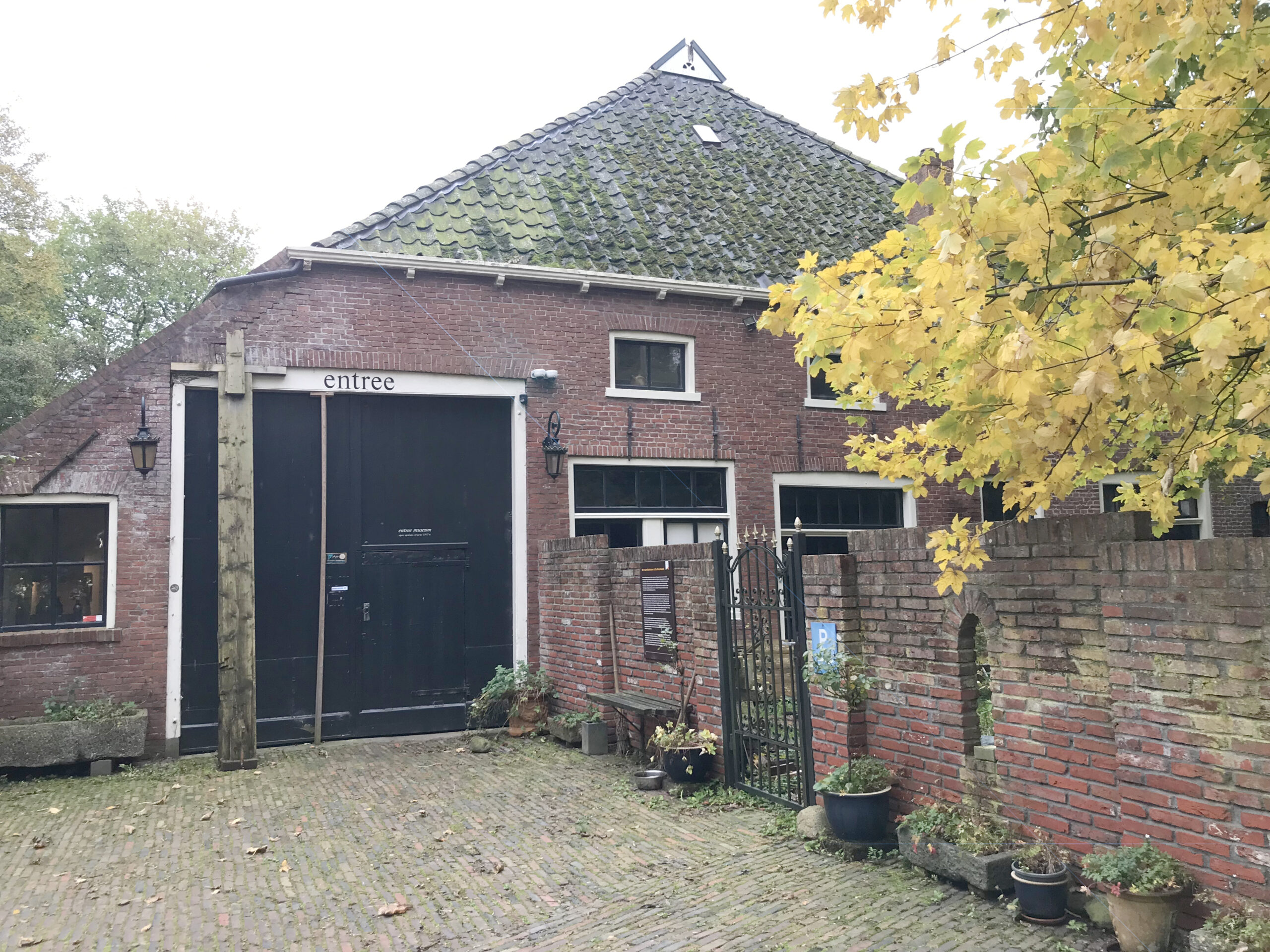
Unsuspectingly, we turned into the small car park of Museum Møhlmann in Appingedam on a beautiful autumn day in 2023. To our surprise, we, Yvonne and Antoinette, great-grandchildren of Ekke Fransema, found a group of people in the new Fransema Cabinet who had each in their own way become involved in this unique book collection. They were Hans Heijerman and Douwe Huizing, who had documented Fransema’s collection and life in the 1980s, Bart and Yvonne Flikkema, who had steadily worked for two years sorting out and arranging the material, curator Cis van Heertum, who had become captivated by Fransema’s story, and of course museum director Rob Møhlmann himself.
When we heard that the collection had almost been lost and that all digital catalogue files had been deleted, we could hardly believe our ears. It was then that we decided to put Ekke’s remarkable life and his book collection back on the map.
The research into the lives of Ekke and Hillegonda Fransema-Venhuis has not been completed. Any suggestions or information that might help to fill in the picture would be very welcome. There is, for instance, little information on the years when the couple lived in Zoeterwoude/Leiden and The Hague, between 1890 and 1906. According to this newspaper, Ekke served on the municipal council of Leiden in 1901 and 1902.
If you have any questions or tips, please mail to: contact@fransemacollectie.nl.

Most of the information we have found so far concerns Ekke. We are also very eager to learn more about Hillegonda. We know that Hillegonda told two fairytales included in Het boek van Minne to its compiler, Eilina Huizenga-Onnekes. They are two Groningen folk tales.
LUITJE HOEKSEMA
Combine your visit to Museum Møhlmann with a trip to ’t Zandt, which is home to the Luitje Hoeksema collection. He was a contemporary of Ekke – they also knew each other – who likewise brought together an impressive collection of books on similar themes. Please check the Luitje Hoeksema Fonds website for opening times.

